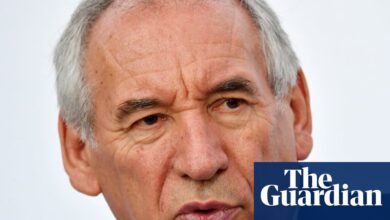Thousands offered UK asylum in secret scheme after personal data of Afghans who helped British forces leaked by mistake – live | Politics

Healey says 900 Afghans, and with 3,600 family members, have come to UK under secret £400m relocation scheme
Healey says the leak happened when an official sent an email which he thought had the names of 150 people who were applying for resettlement under the Afghan Resettlement Programme (ARP).
But in fact the email contained the names of almost 19,000 Afghans hwo had applied for the ARP scheme.
Journalists became aware of the leak, and a court granted a super-injunction preventing reporting of this.
He says eight organisations and journalists have been told not to report what happened under this super-injunction, which has been in place for nearly two years.
He says a scheme was set up to relocate Afghans particularly at risk. It was called the Afghan Response Route (ARR).
He says about 3,000 people were covered by the ARR.
They were subject to strict security checks before admitted to the UK, and they were included in the figures released publicly for the total number of Afghans admitted to the UK.
Healey says, as shadow defence secretary, he was briefed on this. He says he was presented with the super-injunction at the start of that meeting. He says some otheer cabinet ministers only found out about this scheme after the election.
Coming into office, he was “deeply concerned about the lack of transparency to Parliament and to the public”, he says.
Healey say he set up a review of that scheme. It was carried out by Paul Rimmer. The review concluded there was a limted risk of retaliation by the Taliban to Afghans who were named on the original leak. He says the Taliban would have already have had access to information that might have allowed them to identify these people. He says the review concluded the current ARR policy was an “extremely significant intervention to address the potentially limited net additional risk”.
He says he is closing the scheme today. And the super-injunction has been lifted.
He says about 900 have come to the UK or are in transit under the ARR scheme, with 3,600 family members. It has cost £400m, he says.
He says the MoD has tried to contact everyone affected to the data leak to alert them. It has not been possible to contact everyone, he says. But there is a website where anyone who thinks they might have been on the list can seek information.
And Healey offers an apology to those affected.
Key events
-
Judge suggests he was surprised super-injunction held as long as it did
-
Conclusions from Rimmer review into ongoing risks posed by Afghan data leak, and future of ARR scheme
-
Healey apologises to almost 19,000 Afghans whose names were leaked
-
Healey says 900 Afghans, and with 3,600 family members, have come to UK under secret £400m relocation scheme
-
Healey says not being able to tell MPs about secret Afghan resettlement route due to super-injunction was ‘deeply uncomfortable’
-
John Healey makes statement to MPs about secret Afghan relocation scheme set up after data leak
-
Reform UK will fail if they become just home for ‘disgruntled’ former Tories, says James Cleverly
-
Thousands being relocated to UK after personal data leak of Afghans
-
Only 1.5% of people getting universal credit are refugees, DWP figures show
-
Politicians needs to ‘level with voters’ about full extent of budget problems UK faces, new IFS director says
-
Buyers of new EVs under £37,000 can get discount under UK scheme
-
FTSE 100 breaks through the 9,000-point barrier to reach new record high
-
Reeves claims cuts to City red tape will bring trickle-down benefits to households
-
Trump claims he isn’t bothered by King Charles siding with Canada in annexation dispute, saying ‘he has no choice’
-
Trump says UK’s handling of Brexit has been ‘on the sloppy side’, but he claims it’s ‘getting straight now’
-
Trump on Britain: ‘It’s a great place – I have property there’
-
Trump says he ‘really likes’ Starmer, and world leaders who flatter him are ‘just trying to be nice’
-
Trump says he is confident UK would fight with US in a war – but he’s not sure if other Nato allies would
-
Trump declines to back Nigel Farage’s call for parliament to be recalled so he can address MPs during state visit
Judge suggests he was surprised super-injunction held as long as it did
In his written ruling today Mr Justice Chamberlain suggested he was suprised that the super-injunction held foras long as it did. He said:
Those involved in this long-running and unprecedented case have known throughout that there would come a time when the superinjunction could no longer be maintained.
I decided that this point had been reached over a year ago. The Court of Appeal disagreed.
For the last year, my assumption has been that the injunction might fall to be discharged when the information protected by it leaked into the public domain through the media in the UK or abroad.
The parties have updated the court on a continual basis about the extent to which knowledge of the underlying matters has spread.
It is one of the many remarkable features of the litigation, and very much to the credit of the media organisations and individual journalists involved, that there has been no mention in the media of the underlying matters while the superinjunction remained in force.
Conclusions from Rimmer review into ongoing risks posed by Afghan data leak, and future of ARR scheme
Here are the key conclusions from the Paul Rimmer review about the ongoing risks posed by the original data leak, and the
-Appalling human rights abuses occur – including extra-judicial killings – against former officials. But there is also limited evidence to suggest that [certain individuals] have been targeted with any degree of consistency.
-Given the nearly four years since the Taleban takeover, posing a current threat or resistance to Taleban rule is likely to be a far more persuasive factor in the threat faced by individuals in Afghanistan, rather than former affiliations. As such, it appears unlikely that merely being on the dataset would be grounds for targeting. It is therefore also unlikely that family members – immediate or more distant – will be targeted simply because the “Principal” appears in the dataset.
-Should the Taleban wish to target individuals the wealth of data inherited from the former government would already enable them to do so. Additional data is always of interest to develop leads for investigative or targeting purposes. Publicity about the dataset’s loss would inevitably raise interest in acquiring it. But it is highly unlikely it would be the single, or definitive, piece of information enabling or prompting the Taleban to act. It is a “piece of a puzzle” rather than a “smoking gun”.
-No evidence points clearly to Taleban possession of the dataset. It is plausible the dataset (its actual content, rather than knowledge that a dataset exists) has not spread as widely or as rapidly as was initially feared.
-Given this context, the current ARR policy appears an extremely significant intervention, with not inconsiderable risk to HMG and the UK, to address the potentially limited net additional risk the incident likely presents. Based on the conclusions of this policy review, and the level of risk inherent within the current ARR policy, HMG could consider amending the approach to reflect the value the dataset offers. The Taleban already have access to significant volumes of data which enables them to identify personnel associated with the former government. The family and community based nature of Afghan society means former roles and associations are often already well known. The dataset is unlikely to significantly shift Taleban understanding of individuals who may be of interest to them. As a result, it is unlikely to profoundly change the existing risk profile of individuals named on the dataset.
This is what the judge, Mr Justice Chamberlain, said in his ruling today lifting the super-injunction.
[The super-injunction] was granted and continued because of the risk that, if the Taliban learned about the existence of the dataset, it is likely that they would be able to acquire it and would use it to identify those who had applied for relocation and target them for extra-judicial killing or severe physical ill-treatment.
The super-injunction is now being discharged following a review commissioned by the Ministry of Defence, which concludes that the Taliban likely already possess the key information in the dataset, that it is unlikely that individuals would be targeted simply because of their work for the UK or allied governments or for the former government of Afghanistan and that the acquisition of the dataset is accordingly unlikely substantially to raise the risk faced by the individuals whose data it includes.
Here is the press summary of the judgment today.
And here is the full judgment today, which includes the Paul Rimmer review of the ARR scheme.
In his opening statement John Healey also said that 36,000 Afghans had been accepted by Britain under the various schemes set up after the fall of Kabul. He said:
Britain has honoured the duty we owe to those who worked and fought alongside our troops in Afghanistan.
The British people have welcomed them to our country, and in turn, this is their chance to rebuild their lives, their chance to contribute and share in the prosperity of our great country.
He also said that he had spent “many hours” deliberating on how to resolve this matter.
I recognise my statement will prompt many questions. I would have wanted to settle these matters sooner, because full accountability to parliament and freedom of the press matter deeply to me. They’re fundamental to our British way of life.
However lives may have been at stake, and I’ve spent many hours thinking about this decision. Thinking about the safety and the lives of people I will never meet, in a far-off land, in which 457 of our servicemen and women lost their lives.
So this weighs heavily on me, and it’s why no government could take such decisions lightly, without sound grounds and hard deliberations.
Healey apologises to almost 19,000 Afghans whose names were leaked
And this is what John Healey said in his original statement about what the government is doing now to alert the almost 19,000 Afghans named in the original leak. He said:
My first concern has been to notify as many as possible affected by the data incident and provide them with further advice.
The MoD [Ministry of Defence] has done this this morning, although I have to say to the house, it has not been possible to contact every individual on the dataset, due to its incomplete and out-of-date information.
However, anyone who may be concerned can head to our new dedicated gov.uk website, wherein they will find more information about the data loss, further security advice, a self-checker tool which will inform them whether their application has been affected, and contact steps for the detailed information services centre, which the MoD has established.
This serious data incident should never have happened.
It may have occurred three years ago under the previous government, but to all those whose information was compromised, I offer a sincere apology today on behalf of the British government, and I trust the shadow defence secretary, as a former defence minister, will join me.
This is what John Healey said in his opening statement about the original leak.
The spreadsheet, in fact, contained personal information associated to 18,714 Afghans who had applied either to the ex gratia or the Arap (Afghan Relocations and Assistance Policy) scheme on or before January 7 2022.
It contained names and contact details of applicants, and in some instances, information relating to applicants’ family members, and in a small number of cases, the names of members of parliament, senior military officers and government officials were noted as supporting the application.
This was a serious departmental error.
Healey says 900 Afghans, and with 3,600 family members, have come to UK under secret £400m relocation scheme
Healey says the leak happened when an official sent an email which he thought had the names of 150 people who were applying for resettlement under the Afghan Resettlement Programme (ARP).
But in fact the email contained the names of almost 19,000 Afghans hwo had applied for the ARP scheme.
Journalists became aware of the leak, and a court granted a super-injunction preventing reporting of this.
He says eight organisations and journalists have been told not to report what happened under this super-injunction, which has been in place for nearly two years.
He says a scheme was set up to relocate Afghans particularly at risk. It was called the Afghan Response Route (ARR).
He says about 3,000 people were covered by the ARR.
They were subject to strict security checks before admitted to the UK, and they were included in the figures released publicly for the total number of Afghans admitted to the UK.
Healey says, as shadow defence secretary, he was briefed on this. He says he was presented with the super-injunction at the start of that meeting. He says some otheer cabinet ministers only found out about this scheme after the election.
Coming into office, he was “deeply concerned about the lack of transparency to Parliament and to the public”, he says.
Healey say he set up a review of that scheme. It was carried out by Paul Rimmer. The review concluded there was a limted risk of retaliation by the Taliban to Afghans who were named on the original leak. He says the Taliban would have already have had access to information that might have allowed them to identify these people. He says the review concluded the current ARR policy was an “extremely significant intervention to address the potentially limited net additional risk”.
He says he is closing the scheme today. And the super-injunction has been lifted.
He says about 900 have come to the UK or are in transit under the ARR scheme, with 3,600 family members. It has cost £400m, he says.
He says the MoD has tried to contact everyone affected to the data leak to alert them. It has not been possible to contact everyone, he says. But there is a website where anyone who thinks they might have been on the list can seek information.
And Healey offers an apology to those affected.
Healey says not being able to tell MPs about secret Afghan resettlement route due to super-injunction was ‘deeply uncomfortable’
John Healey starts by saying he is making a statement on a data breach from February 2022 that led to the last government setting up a secret Afghan resettlement route.
It was covered by a super-injunction. But from noon today that court restriction has been lifted.
Healey says he is closing that resettlement route.
He says it has been “deeply uncomfortable” being unable to tell MPs about this.
John Healey makes statement to MPs about secret Afghan relocation scheme set up after data leak
John Healey, the defence secretary, is about to make a Commons statement about an astonishing story that just became public about half an hour ago.
Reform UK will fail if they become just home for ‘disgruntled’ former Tories, says James Cleverly

Peter Walker
Peter Walker is a senior Guardian correspondent.
Reform UK might have to choose between presenting itself as a new and radical political party or as a home for “disgruntled former Conservatives” who lost their seats at the election, James Cleverly has said.
Cleverly, the former home and foreign secretary, who stood to replace Rishi Sunak as Tory leader, also argued that Nigel Farage’s party could suffer if the councils it now runs struggle to properly manage key everyday services like bin collections and social care.
Speaking at an event in Westminster, Cleverly also discounted the idea that he hoped to replace Kemi Badenoch, saying his party had to “get out of this habit of cycling through leaders in the hope that ditching this one and picking a new one will make life easy for us”.
Answering questions following a speech about how mainstream rightwing parties can take on the threat from populism, Cleverly noted the way that Reform had absorbed a series of former Tory MPs, most recently Jake Berry, the former party chair, who whose defection was announced last week. He said:
If their sales pitch is, ‘We’re not like the old political parties’, but they are mainly populated with people from my political party, it’s going to be really hard for them to reconcile that sales pitch.
So what are they? Are they new? Are they different? Are they exciting? Or are they a repository for disgruntled former Conservatives? It’s hard to maintain both angles.
Asked if the defections were damaging for the Tories, Cleverly said it was “unsurprising that some people who are politically ambitious and remain politically ambitious look at the polling numbers and think their best future is to align themselves to the party that’s riding high in the polls”.
He added:
I don’t think it’s smart. I don’t think it’s right. I think people lose credibility, particularly people who were Conservative candidates very, very recently who then basically say, ‘Oh, you know the thing that made me realise I wasn’t really a Tory was being booted out of office by the electorate’.
Since the local elections in May, 10 English councils are now run by often very inexperienced Reform groups. While Cleverly said it was possible they would manage the process well, he argued that failure would be noticed by voters.
Local government is the bit of government people feel most instantly. This is the bit of government that runs adult social care, their roads, their schools, their waste collection. When governments get stuff like that wrong, people notice and people respond.
Thousands being relocated to UK after personal data leak of Afghans
Thousands of people are being relocated to the UK as part of a secret £850m scheme set up after a personal data leak of Afghans who supported British forces, it can now be reported. PA Media says:
A dataset containing the personal information of nearly 19,000 people who applied for the Afghan Relocations and Assistance Policy (Arap) was released “in error” in February 2022 by a defence official.
The breach resulted in the creation of a secret Afghan relocation scheme – the Afghanistan Response Route – in April 2024.
The scheme is understood to have cost around £400 million so far, with a projected cost once completed of around £850 million.
Millions more is expected to be paid in legal costs and compensation.
The Ministry of Defence (MoD) only became aware of the breach over a year after the release, when excerpts of the dataset were anonymously posted onto a Facebook group in August 2023.
John Healey, the defence secretary, is making a statement to MPs listed as an “Afghanistan update” at 12.30pm.
Only 1.5% of people getting universal credit are refugees, DWP figures show
Data showing the immigration status of people claiming universal credit has been published for the first time, PA Media reports. PA says:
Around four in five (83.6%) of those on the benefit as of last month were British and Irish nationals and those who live or work in the UK without any immigration restrictions.
This amounted to 6.6 million of the total 7.9 million people on universal credit (UC) in June.
The Department for Work and Pensions (DWP) said it had published the statistics “following a public commitment to investigate and develop breakdowns of the UC caseload by the immigration status of foreign nationals in receipt of UC”.
UC is a payment to help with living costs and is available for people on low incomes or those who are out of work or cannot work.
The next largest group on UC were people with EU Settlement Scheme settled status who have a right to reside in the UK, accounting for 9.7% (770,379), while 2.7% (211,090) of the total had indefinite leave to remain in the UK.
Refugees accounted for 1.5% (118,749) of people on UC, while 0.7% (54,156) were people who had come by safe and legal humanitarian routes including under the Ukraine and Afghan resettlement schemes.
A total of 75,267 people – making up 1% of the total on UC – had limited leave to remain in the UK, covering those with temporary immigration status.
The rest – some 65,346 people – were either no longer receiving UC payments or had no immigration status recorded on digital systems, the DWP said.
The total number of people on UC has risen from 6.8 million in June 2024 to 7.9 million a year later.
And here is a chart from the main DWP report. The full DWP figures are here.

Ben Quinn
Ben Quinn is a senior Guardian correspondent.
A candidate for Reform UK in the recent local elections has defended his attendance this month at an annual Summer festival organised by the Far Right group, Patriotic Alternative.
Joe Custodio, who came within 86 voters of becoming a councillor on Reform-controlled Lancashire County Council, said he had no regrets about attending the Far Right event earlier this month. He told the Guardian:
Someone who was attending asked me to go with them and I went there for a couple of hours. What I saw was a bunch of families camping out in a field and listening to music.
Custodio was identified by Searchlight, the anti-fascist magazine, as having attended the Patriotic Alternative camp after a picture was posted online by a Far Right activist.
Patriotic Alternative has been regarded as one of the UK’s largest far-right group and has been the focus of calls for it be banned.
Its Nazi-sympathiser founder Mark Collett has previously for its supporters to “infiltrate” Nigel Farage’s Reform UK party to push their own “pro-white” and anti-immigration agenda.
Custodio denied that he was part of any Patriotic Alternative attempt to infiltrate Reform UK. He said that he believed the friend who he attended with is a member of Patriotic Alternative. Custodio said he saw no contradiction in attending the event and intended to continue being involved with Reform.
A spokesperson for Reform UK said: “Joe Custodio is not a candidate for Reform UK in any forthcoming election and is not a member of the party.”




